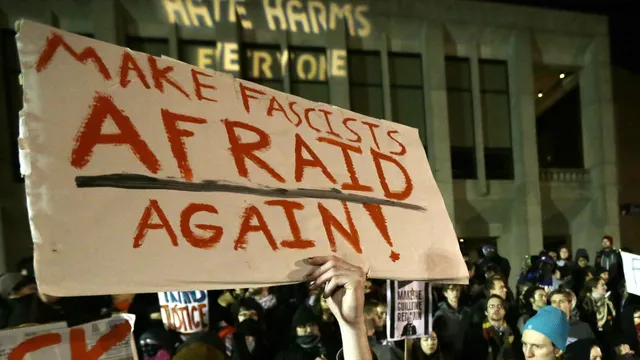
Harris Calls Trump 'Fascist' Amid Ongoing Democracy Debate
2024-10-29 00:00- In late October 2024, discussions about Donald Trump's political identity intensified when Kamala Harris and General John Kelly described him as fitting the definition of fascism.
- Experts highlight the evolution of the term fascism, noting both historical context and its contemporary application to Trump, particularly his inflammatory rhetoric against opponents.
- The debate over Trump's alignment with fascism raises critical questions about the health of democracy in the United States and the implications of political narratives.
Express your sentiment!
Insights
In late October 2024, discussions around Donald Trump's political alignment intensified when Vice President Kamala Harris characterized him as a fascist during a CNN interview. This assertion aligns with remarks made by retired Marine General John Kelly, Trump's longest-serving chief of staff, who also expressed similar views about Trump fitting the general definition of fascism. These comments arise in the context of ongoing debates among political scholars about the criteria for labeling someone as fascist, particularly amid concerns over Trump's rhetoric and influence following the Capitol siege in 2021. Experts explain that while fascism historically involved the militarization of power and suppression of opposition, the term has become more loosely defined in contemporary discourse. Some scholars emphasize that Trump's actions have drawn parallels with traditional fascist behaviors, particularly in his portrayal of opponents as enemies and calls for retribution against critics, which mirrors classic fascist tactics of inciting fear and division. Nevertheless, academics are divided on whether the fascist label accurately captures the essence of Trump’s ideology. For some, the lack of a coherent ideological framework in Trump's policies makes such categorization more complex. Others argue that Trump's political discourse, which includes targeting and vilifying opponents, raises alarms about the erosion of democratic norms and principles. The discourse surrounding Trump's potential fascism reflects broader societal anxieties about the future of democracy in the United States, revealing the urgent need for critical examination of political narratives and their implications for governance.
Contexts
Once just a whisper in the political winds of early 20th century Europe, fascism emerged from the ashes of World War I, coalescing into a formidable ideology that reshaped nations and defined an era. Rooted in a reactionary response to the chaos of war and economic strife, it found expression in the charismatic leadership of figures like Benito Mussolini in Italy and later Adolf Hitler in Germany. These leaders promised strength, order, and national rejuvenation, tapping into the grievances of a populace yearning for stability amid the tumult. The term 'fascism' itself, derived from the Italian word 'fascio,' encapsulated notions of unity and power, representing the binding together of individuals into a collective identity. As fascism rose, it championed the supremacy of the state above the individual, often employing propaganda to stoke nationalist fervor and demonize perceived enemies. This ideological framework painted complex issues as black and white, leading to widespread support for militarism and aggressive expansionism. While its promises of restoration and glory gained traction in many countries, it simultaneously sowed the seeds of division and hatred, targeting minorities and dissenters as scapegoats for society's ills. Fascist movements often sought to control all aspects of life, considering any form of opposition a threat to their vision of national greatness. The consequences were catastrophic, culminating in World War II and the Holocaust, one of history’s darkest chapters that dismantled the veneer of prosperity promised by fascist regimes. The legacy of fascism, marked by intolerance and violence, compels a continuous reevaluation of its implications in contemporary politics. Even in modern-day society, the echoes of fascism resound, as individuals and groups exploit vulnerabilities, fanning the flames of nationalism while often disregarding democratic values. This persistent challenge underscores the importance of vigilance and education, emphasizing that the shadows of history can resurface if they are not rigorously confronted.